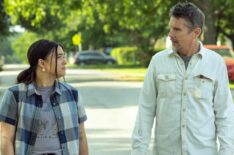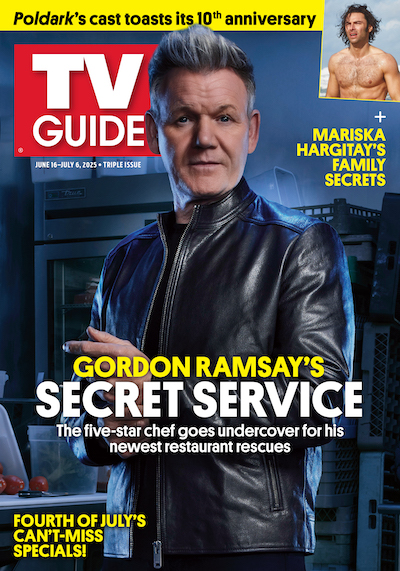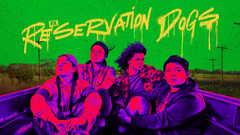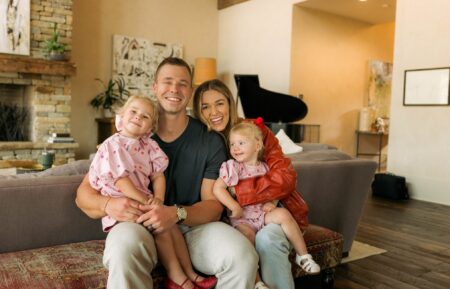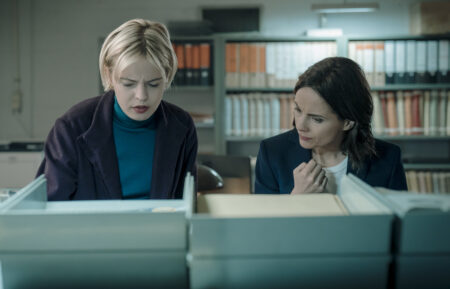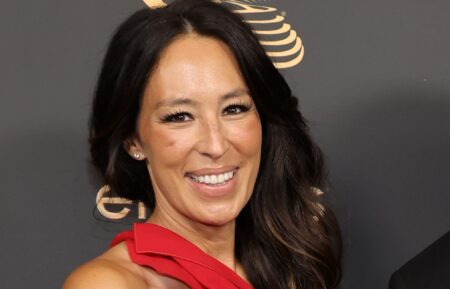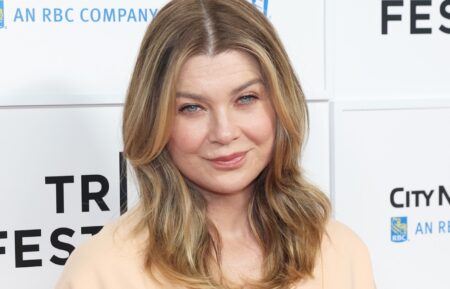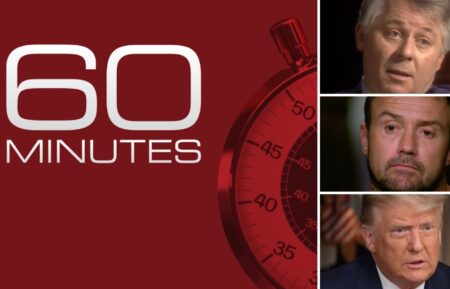‘Reservation Dogs’ Creator Sterlin Harjo Breaks Down Emotional & Satisfying Series Finale
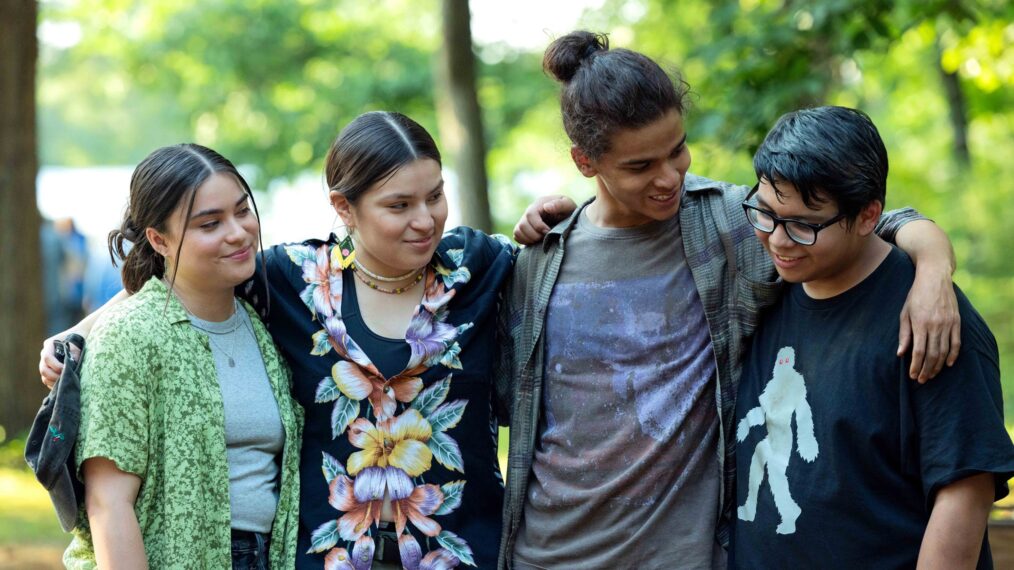
Spoiler Alert
[Warning: The below contains MAJOR spoilers for Reservation Dogs Season 3, Episode 10, “Dig.”]
Reservation Dogs may only feature 28 episodes, but its impact will far exceed its runtime. This is especially true after delivering a delightfully satisfying conclusion to a flawless three-season run with the moving finale installment, “Dig.”
The episode co-written and directed by series creator Sterlin Harjo follows the Reservation Dogs, Bear (D’Pharaoh Woon-A-Tai), Elora (Devery Jacobs), Willie Jack (Paulina Alexis), and Cheese (Lane Factor) as they join their community to bid Old Man Fixico (Richard Way Whitman) farewell. The celebration of life pulls together the aunties, elders, and fan favorites on the fringes (like Kirk Fox’s Kenny Boy) of Okern for a fantastic ensemble episode that places each of the core four characters on their destined paths.
Willie Jack kicks off the episode with a visit to her aunt Hokti (Lily Gladstone) who viewers will remember from Season 2’s powerful entry, “Offerings.” Telling Hokti about Fixico’s death, Willie Jack is taught that when someone dies, everyone who knew them in life carries a part of them in death. It’s a message about the importance of community and conveys a new outlook for Hokti who had been less optimistic following the death of her son Daniel (Dalton Cramer). From that point forward, Willie Jack leads the celebration of Fixico’s life, speaking at his funeral and being the first to break ground on digging his grave.
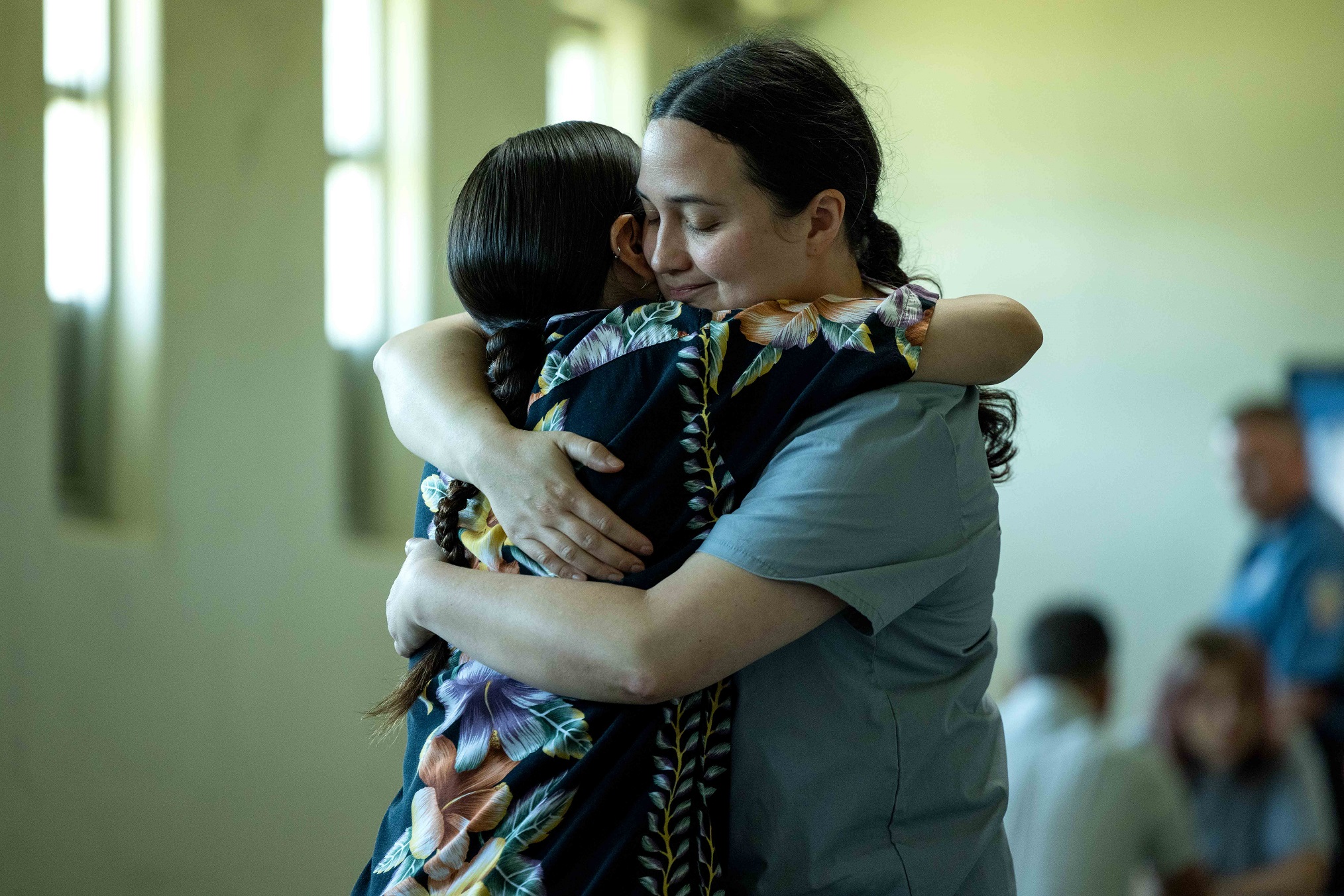
(Credit: Shane Brown/FX)
Meanwhile, Elora finally decides to pursue a college degree. Still, she is hesitant to break the news to Bear about her enrollment after learning his mom, Rita (Sarah Podemski), would be leaving Okern for a new job in Oklahoma City. When Elora does finally tell Bear, he is understanding of his friend’s next chapter, and the pair have a heart-to-heart so genuine you can’t help but want to shed a tear or two.
There’s a resolution for Season 3’s Maximus (Graham Greene), who reunites with his pals Bucky (Wes Studi) and Brownie (Gary Farmer) after decades of estrangement. There’s humor found in Big (Zahn McClarnon) and Bev’s (Jana Schmieding) blossoming relationship. And there’s plenty of hope for a better tomorrow after so much hardship for these lovable characters as they lean on each other. Below, Harjo explains the ending of Reservation Dogs, the character’s paths, the show’s impact, and much more.
It’s hard to believe this is the end of Reservation Dogs. Was it always going to be three seasons, or did you have hopes to continue the stories of these characters?
Sterlin Harjo: I always knew that it would end in this fashion. I think it’s best to leave people wanting more. I think that if you leave people wanting more, the show continues in everyone’s mind. I think that I knew where the story was going. I didn’t know when we would get there, and it was just evident when writing and making Season 3 that it needed to be there.
Narratively, the series begins with a death and ends with one. Unlike Daniel though, who took his own life at such a young age, Old Man Fixico’s death felt less hopeless and more like a celebration. Did you always intend to end it that way?
For sure. I’ve been to a lot of funerals. I’ve been a pallbearer fourteen times or something like that. I have a big family, I have a big community, and it’s a show about learning how to show up for community. To me, the Reservation Dogs aren’t just the kids; the Reservation Dogs are the whole community, and you see how they all play a part in that. It’s about them bringing back lessons that they learned from the loss of their friend and helping their elders and themselves move on from the loss of Old Man Fixico. So, the last episode is an illustration of everything the show’s about to me, what they’ve learned, and how you actually apply those lessons to the community, which I just don’t think you see often in television.
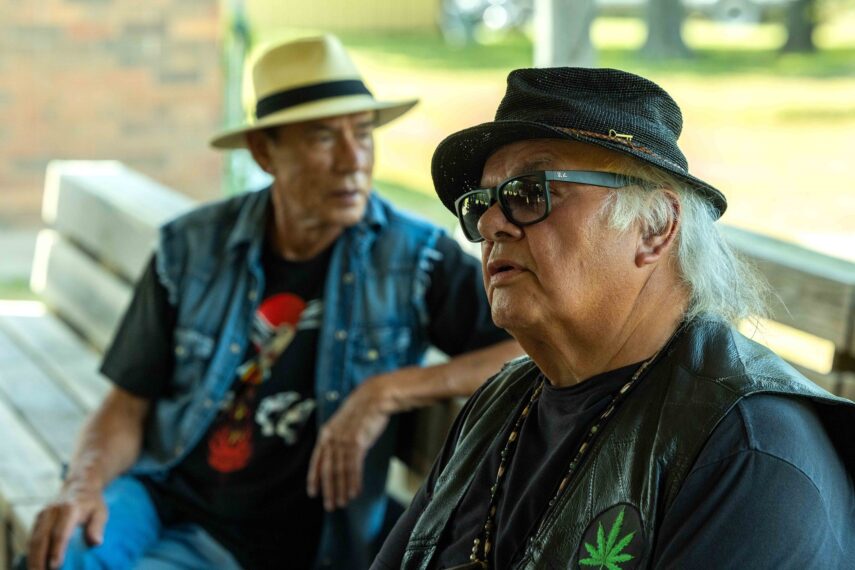
(Credit: Shane Brown/FX)
The episode opens with Willie Jack visiting Daniel’s mom, her aunt Hokti in jail. Why was it important to revisit her character who seemingly has a much more positive lesson and outlook to share surrounding death and community?
I knew I was going to bring that character back, but I didn’t know if she was going to be out of jail or still in jail. I ultimately liked where we landed because it illustrates how she can be a part of the community even within those walls and can give lessons and also is of value. I think we devalue a lot of people who are institutionalized, and I think that showing her value even from inside was important to me.
Fixico’s death also reunites Maximus with his estranged pals Bucky and Brownie. Since their bonds were a key story point this season, what was it like getting to see that moment unfold?
I mean, first, it was just an honor to have those legends share the screen, which I don’t think they’ve ever shared the screen before. They’ve been in the same films, but not at the same time, which I’m very proud to be able to do that. A lot of it was too was, I just love all of those guys. [They] are funny, and they always have been, but they were always cast as very serious people and warriors and things like that. Their humor always came through, but I never saw anything where they got to truly be just themselves and be funny. And I know that they all had so much fun making the show.
On one level, too, especially for Native people, seeing our iconic actors imparting these lessons, it’s even more meaningful, I think. Imagine being a young native kid today growing up because I didn’t have a show like this, and everywhere I go, young people love the show. I can’t imagine just being able to turn a show on and see yourself and your elders and all of your community being represented. It’s huge. And I don’t think that we’ll know how big it is and what an impact it has for a long time. But I feel it already.
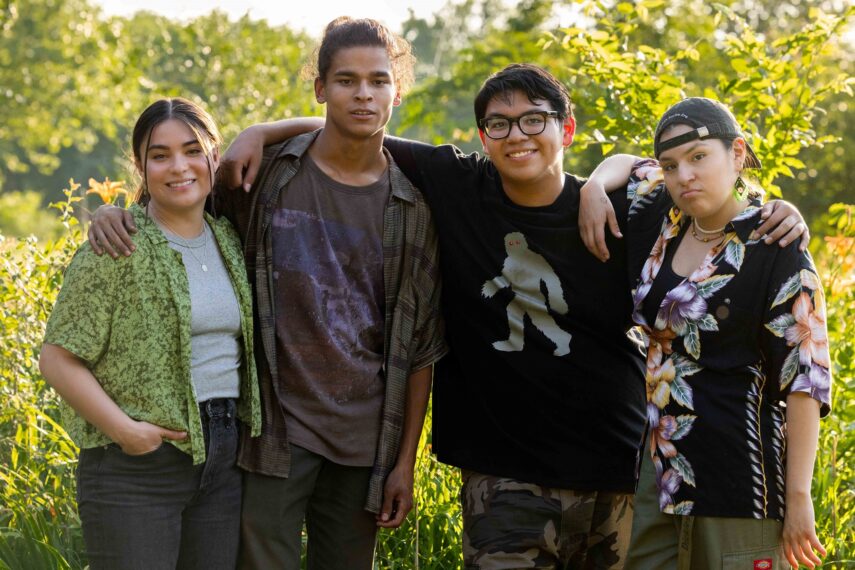
(Credit: Shane Brown/FX)
It’s a show that’s definitely grown in popularity from season to season. I love that the show allows people less familiar with the Indigenous community to learn about it.
I think that you learn a lot from other communities. It’s like traveling, right? Some of the best humans and most well-rounded people are people who travel and visit other communities and are open to that. And I think that the show, the way it was made, allows people to be very open to it. And I think people from all different backgrounds learn from the show.
When Elora tells Bear about her college plans, she’s reluctant to share it with him. She also tells Bear that she loves him, which they don’t usually say so blatantly to each other. How important was it for them to have that breakthrough in their relationship?
They say it, but they’ll say, “I love You, bitch,” which is kind of turned into a joke a little bit. But yeah, I think it was a really important scene. I cry every time. I watched it multiple times. And the actors’ performances are so great in it, and in a way, it’s them talking to each other too because they’ve been on this journey for over three years. But also for Elora, there are also community members who leave. And your community, a lot of times helps you leave.
Everyone in her life wants her to leave and do well because that’s what her mom couldn’t do, and they had so many dreams, so many dreams were killed with her mom’s passing, and they’ll never know what her mom could have done or could have been. So I think there is even more pressure for her to leave and everyone knows she’s going to leave, but they try their best to give her what she needs. And I think that she will, in turn, still come back to that community and still be a part of it, even though she’s leaving.
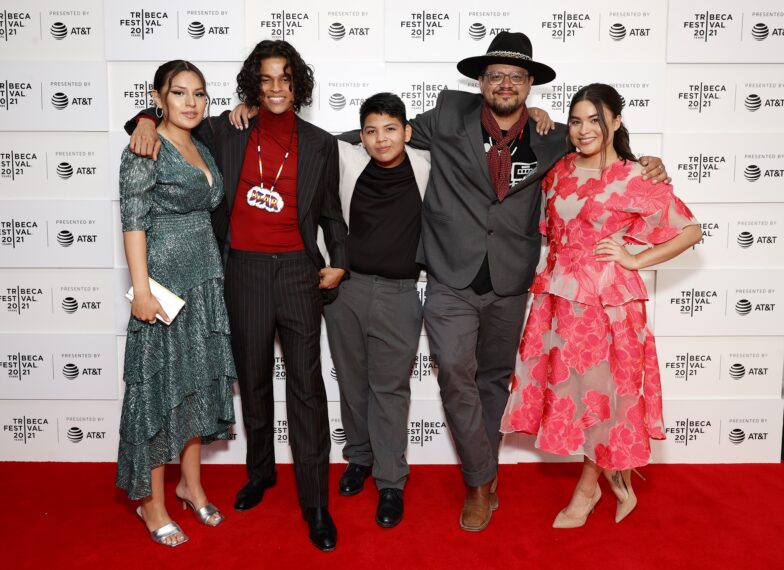
(Credit: Arturo Holmes/Getty Images for Tribeca Festival)
When she says she’s going to come back on the weekends, I believe her.
It’s always scary whenever you’re trying to predict that. It’s scary, and you can tell there’s fear in her when she says it, but I think that she needed to tell Bear that she loved him, and he needed to tell her that he loved her. It was a meaningful relationship, and they pushed and pulled throughout the season, but they loved each other. And it’s also important to show kids saying that too, I think. I love that moment.
On the lighter, more comical side of things, what inspired the Big (Zahn McClarnon) and Bev (Jana Schmieding) romance this season? Was there any improv involved?
There’s definitely improv. They stick to the script, but they’ll go off when you need ’em to. But it wasn’t a plan; it just made sense. I felt like Big needed someone to love, and he has this guilt that he deals with, and we want to heal for a couple of seasons. We found him this season in a better place where I think that he could take on a relationship… a really dirty-talking relationship. He needs some of that, some love. And I think Bev similarly does. Part of it, too, is that they’re just them, those actors together; they’re so funny that I couldn’t wait to get those characters together.
In general, is there room for improv behind the scenes? Or do you prefer that actors stick to the script?
Yeah, I always play around with different actors. Some actors don’t improv, and some actors do. And I mean Paulina [Alexis] for instance, I give her lines, and then I encourage her to make it her own and to try things. And a lot of times, especially when there are comedic actors who are good at improv, I will encourage them to improvise the last couple of takes. With comedy especially, you can really time out a joke, and we do that a lot, but sometimes the surprise and the freshness in an improvisational performance is what really makes it funny. So I try to play with that as much as possible. But with every actor, I work differently.
Closing the series out, Bear calls to Spirit, William Knifeman (Dallas Goldtooth), seeking a final lesson. It is ultimately about the importance of community. Was Spirit always meant to be a teacher, or was he meant to fill that father figure role Bear was missing in his life when the show debuted?
I think that Bear was in a very vulnerable place when he lost his best friend, and he didn’t have a father. And I think that he did need a male in his life who could give him hard, vague lessons. I think he needed that and needed it to be a relationship outside of his mother because he cares about his mom so much and tries to take care of her as much as he can. So, I think that he needed someone to step in like that. And was it created in his mind? I don’t know. But William Knifeman, I just thought, was a great addition.
Also, that character helped introduce people to Native humor because you kind of need something broad to really get people to understand the rhythm, and he is the broad version of Native humor. And then you go into more nuanced Native humor, which is like Gary Farmer, Paulina Zahn McClarnon’s Big, and Bev with Jana. That’s the more nuanced version of our humor, I think, and that’s what I ultimately wanted to do. But Dallas’ William Knifeman is the broadest version of our Native humor, and I think that you kind of need that to open the audience up to all of it. I think that he served a lot of purposes, but he was also there for the audience.
Reservation Dogs, Streaming now, Hulu
From TV Guide Magazine
Behind the Scenes With Gordon Ramsay: 20 Years of Cooking Up TV Hits
The celebrity chef reflects on redefining culinary television and his fiery journey Hell’s Kitchen to Secret Service. Read the story now on TV Insider.

